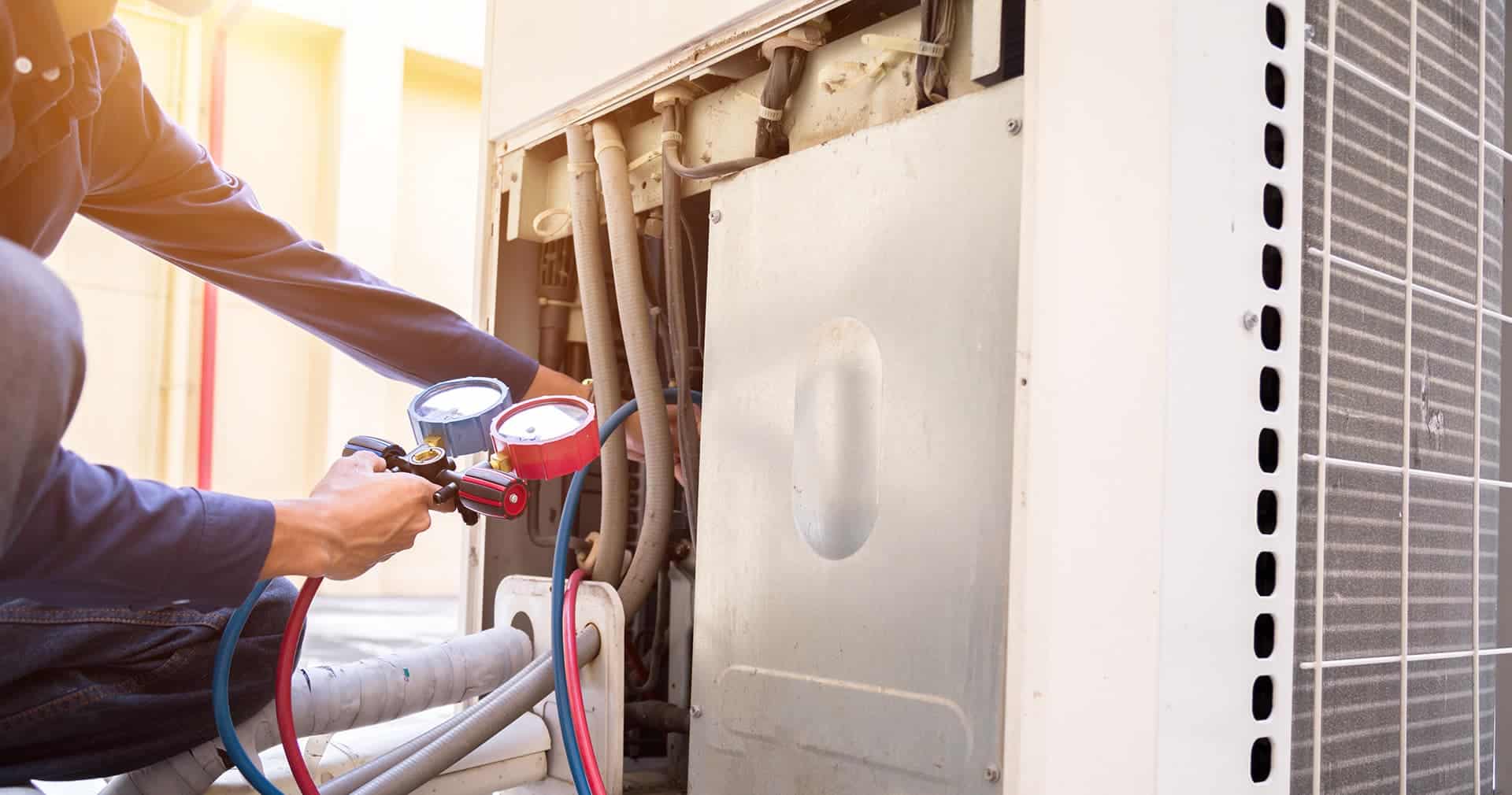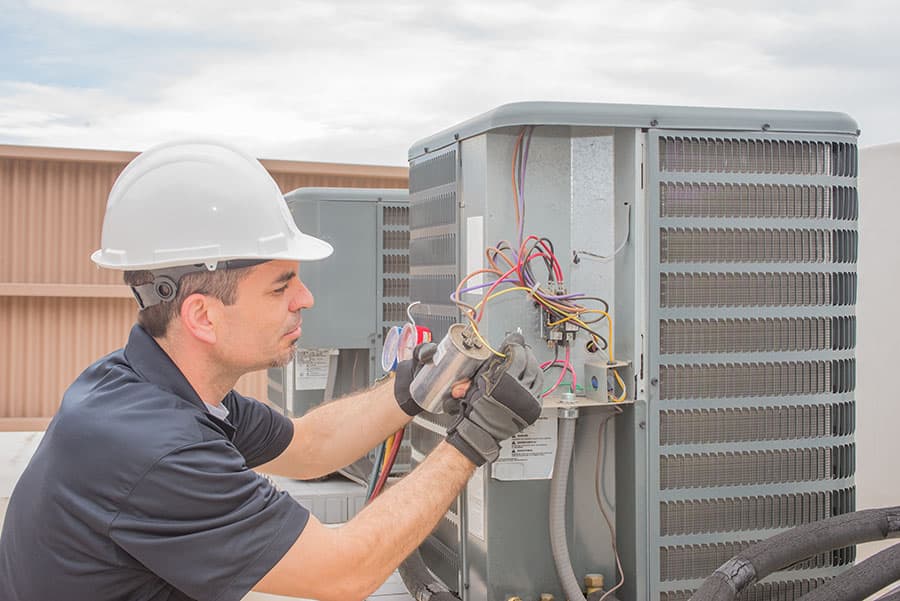Checking Out the Necessary Components of an Efficient Cooling And Heating System
An effective HVAC system is developed on a number of vital parts that work in harmony. Each component, from the thermostat to the ductwork, plays a vital duty in maintaining convenience and energy performance. Comprehending these aspects is essential for maximizing performance and boosting interior air top quality. As one checks out these components, the elaborate relationships between them expose insights into boosting total system performance. What particular variables add most to this efficiency?
The Function of the Thermostat in Heating And Cooling Performance

Although usually overlooked, the thermostat plays a critical role in the performance of a/c systems. HVAC experts. This little gadget serves as the main nerve center, controling temperature settings and guaranteeing excellent comfort within a space. By precisely sensing the ambient temperature level, the thermostat interacts with the heating, air, and ventilation conditioning systems to maintain the preferred environment
An effective thermostat decreases energy usage by activating the cooling and heating system just when essential, thus avoiding too much heating or air conditioning. Modern programmable and clever thermostats enhance this efficiency additionally by permitting customers to set timetables and remotely change setups, adapting to day-to-day routines.
In addition, the placement of the thermostat is crucial; incorrect place can result in incorrect temperature readings, resulting in ineffective operation. In general, a well-functioning thermostat not just enhances convenience however also adds substantially to power cost savings and the durability of the HVAC system.
Recognizing the Relevance of Air Filters
Air filters offer a crucial function in HVAC systems by guaranteeing that the air distributing within a space stays healthy and clean. These filters catch dust, allergens, and other contaminants, avoiding them from being recirculated throughout the atmosphere. By catching these fragments, air filters add to enhanced indoor air quality, which can substantially benefit passengers' health, particularly those with allergies or breathing conditions.
Additionally, maintaining tidy air filters improves the performance of heating and cooling systems. Clogged up filters can limit airflow, triggering the system to work harder to maintain desired temperatures, leading to enhanced energy intake and higher utility bills. Frequently changing or cleansing filters is an essential upkeep action that can lengthen the life expectancy of heating and cooling devices. Inevitably, recognizing the value of air filters permits home owners and structure supervisors to take proactive actions to assure a well-functioning, reliable a/c system that advertises a comfy and secure interior atmosphere.

The Performance of the Heating System and Warm Pump
Heaters and heatpump are important parts of cooling and heating systems, in charge of supplying heat throughout cooler months. Furnaces operate by heating air with burning or electrical resistance, then dispersing it throughout the home through air ducts. They typically provide fast home heating and can be fueled by gas, electrical power, or oil, depending on the system kind.
Alternatively, heatpump transfer warm rather than generate it. They draw out heat from the outside air or ground, also in low temperature levels, and move it inside. HVAC experts. This twin capability enables warm pumps to likewise supply cooling in warmer months, making them flexible alternatives for year-round environment control
Both systems need proper upkeep to assure effectiveness and long life. While furnaces succeed in extreme chilly, heatpump can be helpful in modest environments. Comprehending their distinctive performances aids house owners in selecting the most ideal option for their home heating requires.
Discovering the Air Conditioning System
The cooling device is a crucial element of cooling and heating systems, readily available in different kinds to suit various needs. Recognizing the efficiency scores of these units is necessary for making notified selections concerning power intake and cost. This section will certainly check out the diverse sorts of ac system and clear up exactly how performance rankings effect performance.
Kinds Of Air Conditioners
While numerous variables affect the selection of a/c systems, recognizing the various kinds readily available is important for property owners and structure supervisors alike. Central air conditioning conditioners are designed to cool down entire homes or buildings, making use of a network of air ducts for air flow. Window devices provide a more localized solution, suitable for tiny rooms or solitary areas. Portable air conditioners offer versatility, enabling users to relocate the system as needed. Ductless mini-split systems are an additional option, combining the efficiency of main systems with the benefit of zoning, as they need no ductwork. Finally, geothermal systems harness the earth's temperature level for energy-efficient cooling. Each kind includes distinctive benefits, making notified choices crucial for reliable environment control.

Performance Rankings Discussed
Comprehending effectiveness ratings is crucial for picking the best cooling system, as these metrics supply insight right into the system's see it here performance and power usage. The most typical rating for a/c is the Seasonal Power Efficiency Ratio (SEER), which gauges the cooling output during a regular air conditioning season split by the complete electrical energy input. A higher SEER suggests far better effectiveness. In addition, the Energy Effectiveness Ratio (EER) is made use of for determining efficiency under particular conditions. One more important metric is the Power Celebrity qualification, which signifies that an unit fulfills stringent power efficiency standards. By evaluating these rankings, consumers can make educated selections that not only optimize convenience but likewise lower power prices and environmental influence.
The Relevance of Ductwork and Air movement
Efficient ductwork layout and airflow administration play important roles in the total efficiency and efficiency of a/c systems. Proper ductwork guarantees that conditioned air is dispersed equally throughout a room, decreasing temperature variations and enhancing convenience. Well-designed ducts decrease resistance to airflow, lowering the work on HVAC devices and inevitably decreasing power consumption.
Air movement management involves strategically putting vents and signs up to boost the circulation of air. This avoids common problems such as warm or cold places, which can take place when air movement is blocked or improperly balanced. Additionally, the right duct materials and insulation can additionally boost performance by decreasing heat loss or gain during air transportation.
A reliable ductwork system not only adds to power cost savings however can additionally lengthen the life expectancy of cooling and heating devices by lowering unneeded pressure (HVAC experts). Understanding the value of ductwork and air movement is necessary for attaining peak Cooling and heating system efficiency.
Routine Upkeep Practices to Improve Performance
Normal upkeep techniques are necessary for ensuring peak efficiency of a/c systems. These practices consist of regular examinations, cleansing, and required repair services to maintain the system running efficiently. Regularly altering air filters is crucial, as stopped up filters can obstruct air flow and decrease performance. In addition, technicians should examine and clean evaporator and condenser coils to stop overheating and power waste.
Annual specialist evaluations are also advised, as experienced service technicians can identify possible problems before they rise. Lubricating relocating components reduces deterioration, adding to a longer life expectancy for the system. Guaranteeing that the thermostat functions properly help in preserving optimal temperature control.
Regularly Asked Concerns
Just how Frequently Should I Change My Thermostat?
Thermostats must normally be changed every 5 to 10 years, relying on use and technology developments. Normal checks are suggested to assure peak efficiency, particularly if experiencing inconsistent temperature control or boosted power costs.
What Size Air Filter Is Ideal for My A/c System?
The most effective size air filter for an a/c system varies by unit layout. Usually, it's vital to seek advice from the proprietor's guidebook or inspect the existing filter measurements to guarantee peak efficiency and air top quality.
Can I Mount a Heat Pump Myself?
Installing a heatpump individually is feasible for proficient individuals, however site web it calls for expertise of neighborhood codes and electrical systems. Hiring a professional is recommended to ensure proper setup and perfect system efficiency.
Just how Do I Know if My Ductwork Is Reliable?
To establish ductwork performance, one ought to look for leakages, procedure air flow at vents, examine insulation high quality, and review temperature level distinctions in between supply and return official statement ducts. Specialist assessments can give comprehensive insights right into general efficiency.
What Are Indications My Cooling And Heating Requirements Immediate Upkeep?
Indications that a HVAC system requires prompt upkeep include unusual sounds, inconsistent temperatures, increased energy costs, undesirable odors, and regular cycling. Dealing with these issues promptly can avoid additional damage and guarantee optimal system performance.
Air filters offer a necessary feature in A/c systems by ensuring that the air flowing within an area stays clean and healthy. Additionally, keeping clean air filters improves the performance of A/c systems. Ductless mini-split systems are another option, incorporating the efficiency of central systems with the convenience of zoning, as they need no ductwork. Understanding effectiveness ratings is crucial for choosing the appropriate air conditioning device, as these metrics offer insight into the system's efficiency and power intake. The finest dimension air filter for a Cooling and heating system varies by system layout.